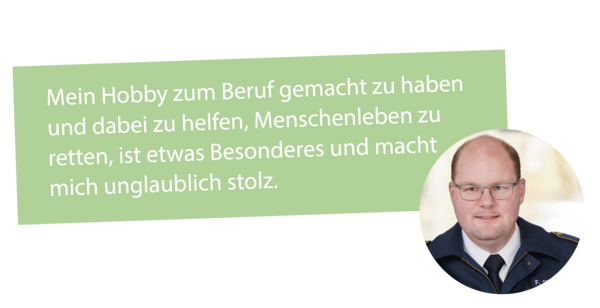


After studying chemistry, Frank Spahlholz decided to turn his hobby into a career and become a fire service officer. In 2022, he completed his preparatory service and has since worked as a fire officer and fire service lecturer in the field of crisis management and disaster protection.
When I was little, I once said: "When I grow up, I'll be a firefighter!". At the age of 11 I joined the youth fire brigade in my town and I was always enthusiastic about the fire brigade. After graduating from high school, I began studying technical chemistry at Cologne University of Applied Sciences while doing my compulsory military service with the volunteer fire brigade. I already noticed the intersections between the fire brigade and the chemical industry there, and I was able to demonstrate my knowledge there in two operations involving dangerous chemical goods. After completing my bachelor's degree, I completed my master's degree in Bonn. There the call in me became louder, "Turn your hobby into a job and you have free time every day!". And then I just did it and now I'm overjoyed.
As with all candidates for the second entry position in career group 2, the traineeship was due before starting a career. I learned a lot about firefighting here. From the basics, e.g. For example, how to connect two hoses to each other, leadership training in the various management levels and management issues, I was taught the tools for my later use in the fire service. I have learned to take on managerial tasks and also to coordinate larger deployments.
I was aware from the start that a future job in the fire service was fundamentally an option for me. After my studies, I was able to start my career training straight away.
The institute of the fire brigade NRW is the central education and training facility for managers of the fire brigades in North Rhine-Westphalia.
My job is to train operational and tactical staffs. I prepare them for their complex and responsible tasks, especially in large-scale operations and disasters. In addition to working as a lecturer in firefighting technology, the preparation and follow-up of the lessons is also part of my everyday work. In addition to the firefighting work in the apprenticeship, I am still active in my volunteer fire brigade in order to continue to gain practical experience.
In addition to physical fitness, mental resilience and the ability to make decisions, even under time pressure, are among the absolute must-have criteria in my professional field, because sooner or later one comes into contact with stressful situations in the emergency service. However, if you were able to successfully save human lives, this makes up for the stressful situations many times over. Camaraderie is very important to us, because we can only function as a team in operations of any kind, often we even trust each other with our lives.
My typical working day usually starts days or weeks before: I check whether I have prepared everything for the courses and seminars of the next week and also take care of the preparation of more complex staff frame exercises that are due in the following week. My teaching day usually starts at 7:45 am. Before that, I'm usually at the institute of the fire brigade to make final preparations for the lessons or the exercises. After work, you go home or to the institute's own sports hall with fitness room.
During your studies you were always among "like-minded people", that's fundamentally different in the fire brigade. Expertise from a wide range of disciplines is required here in order to be able to master the complex operational situations that constantly challenge the fire brigade. At the fire brigade, the team is crucial, because in addition to chemists, we also employ biologists, physicists, engineers, architects, administrative specialists, but also people with dual vocational training in the technical field (e.g. craftsmen).
Studying chemistry improved my ability to think analytically, enabling me to keep a cool head in complex operational situations and work through the situation in a structured manner. Thanks to my studies, I can assess the risks of numerous substances in operational situations in connection with chemical hazardous goods and thus protect my emergency services and the population from the dangers emanating from the substances.
I can train people to make the right tactical decisions in critical operational situations. That makes me incredibly proud. It is always challenging to see your own course and seminar participants in the exam. This shows whether your own teaching activities of the last few days have been successful or not.
If you choose to enter career group 2.1 (formerly higher service) with a bachelor’s degree, you can develop well professionally. It is possible to work in different specialist areas (e.g. training, technology, operational organization or risk prevention). If you have professional performance, suitability and qualifications, you can be promoted to career group 2.2 via a one-year preparatory service.
If you choose to enter career group 2.2 (formerly higher service) with a master's degree, you can develop your career even further. Here, however, one is mainly used in managerial positions as department or office heads.
You should be aware that the fire service profession is a very special one, which is incredibly versatile and is characterized by a high degree of responsibility. At the same time, however, it is also a very demanding job that can cause very stressful situations, especially in emergency services.
Note: For reasons of readability, gender-specific language forms are not used at the same time. All personal designations apply to all genders.
This page has been machine translated. If you have any feedback or comments please feel free to contact us. 
last modified: 11.07.2024 14:59 H from N/A